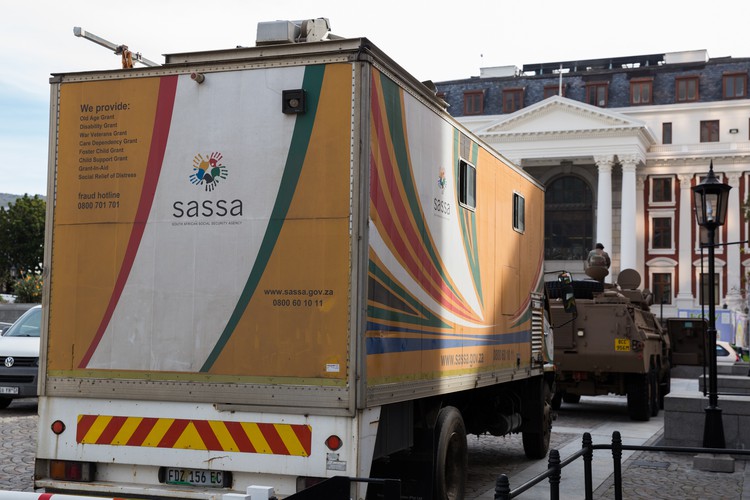Delays with R350-grant payments expected
New regulations may mean August payments are late
Addressing Parliament’s Select Committee for Health and Social Services earlier this week, SASSA said it experienced “teething problems” with the payment of the grant after the new system of monitoring applicants’ bank accounts for income was introduced. Archive photo: Ashraf Hendricks
- Delays with the R350 Social Relief of Distress grant payments are expected in August, says SASSA
- Social Development Minister Lindiwe Zulu gazetted new regulations raising the income threshold for the means test from R350 to R624 per month.
- The department had proposed that the “Covid” grant continues while legislative matters are ironed out for a basic income support.
Beneficiaries of the R350 Social Relief of Distress (SRD) grant may face delays with their August payment after new regulations for the grant were implemented.
Earlier this month, Social Development Minister Lindiwe Zulu gazetted changes to the regulations of the R350 grant. The change increases the income threshold for the means test from R350 per month to R624, the food poverty line. Previously, anyone earning more than R350 a month would have been disqualified.
Bank verifications will no longer be the main criteria for the South African Social Security Agency (SASSA) to determine the applicant’s eligibility.
Beneficiaries also do not need to reconfirm that they are still in need of the grant. Previously people had to reconfirm every three months. But SASSA says it got very few reconfirmations — just about 1.5 million out of 5.2 million.
Addressing Parliament’s Select Committee for Health and Social Services earlier this week, SASSA executive manager for grants administration Brenton Van Vrede said they experienced “teething problems” with the payment of the grant after the new system of monitoring applicants’ bank accounts for income was introduced.
“We didn’t have the luxury where — under normal circumstances when you do something like this — you test it, pilot it and then you implement it. That would probably take about a year to do. In a matter of months, we had to build and implement a system without necessarily being able to do a proper test and pilot to make sure everything is working fine,” Van Vrede told the committee.
Van Vrede said they aim to complete July payments by the end of this week and will start processing August payments from next week.
“Many times, beneficiaries have not provided accurate bank details, sometimes they forget a digit or their names do not correspond with the banking details. And we get a lot of bank verification failure,” he said.
As of 2 August, 81% of applicants approved for April were paid, 79% of applicants approved for May were paid, while 84% of applicants approved for June were paid.
SASSA spokesperson Paseka Letsatsi said by 18 August, over 6.5 million applications were approved for June 2022 and over five million applicants were paid for that month. SASSA received just under 12 million applications at the beginning of August.
Minister Zulu told the committee that although the department had a budget of R44-billion to assist 10.5-million people, only 5.2-million qualified for the grant under the previous regulations.
Civil society organisations launched a court application in June, challenging these “unfair” and “exclusionary” regulations.
Hoodah Abrahams-Fayker, national advocacy manager at the Black Sash, said they believe the amendments directly respond to this litigation.
Basic Income Support
The SRD grant, which was first introduced in May 2020 under the National State of Disaster regulations, was due to end in March 2022 but was extended to March 2023.
The Black Sash has amplified its calls for permanent social assistance for those earning little to no income, and for a universal basic income which must be complemented by job creation.
“In a context of extremely high unemployment, there are not enough jobs to respond to all that are unemployed which imposes a constitutional obligation for the state to provide financial support for them,” said Abrahams-Fayker.
Department of Social Development Deputy Director-General Brenda Sibeko said they are engaging with different departments including the National Treasury to address the ongoing income need after the end of the financial year.
She said although decisions have not yet been made, “one of the things we are cognisant of is that even if that policy gets approved, we will still need to write the legislation and that takes time”.
“So the proposal the Department of Social Development is working on now is how to extend this current SRD grant and then … once a legislative implementation is done … seek basic income support”.
Next: Mobile showers for homeless people: “mother of water” bus launched
Previous: Farm workers in Robertson’s “dumping ground” call for better services
© 2022 GroundUp. This article is licensed under a Creative Commons Attribution-NoDerivatives 4.0 International License.
You may republish this article, so long as you credit the authors and GroundUp, and do not change the text. Please include a link back to the original article.
We put an invisible pixel in the article so that we can count traffic to republishers. All analytics tools are solely on our servers. We do not give our logs to any third party. Logs are deleted after two weeks. We do not use any IP address identifying information except to count regional traffic. We are solely interested in counting hits, not tracking users. If you republish, please do not delete the invisible pixel.



